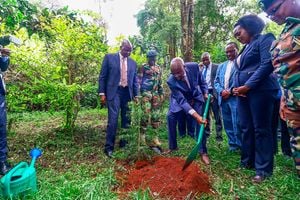Disturbing calls stalk buyers of used lines

Buyers of recycled lines might not know what they are getting themselves into. PHOTO | FILE | NATION MEDIA GROUP
What you need to know:
- Safaricom says in its terms and conditions for prepaid users that it has the absolute powers over use and re-use of lines.
- With the growth of phone-based lending that relies on a person’s phone number, inheriting a recycled line is increasingly becoming a thing to be frowned upon.
A section of mobile phone users is demanding a relook into the way telcos recycle expired lines as complaints from subscribers facing harassment after buying second-generation lines keep piling up.
Through concerns raised on various platforms, the users feel they should be informed about previous ownership of lines (called the Mobile Station International Subscriber Directory Numbers — MSISDN — in technical terms).
This, they say, will go a long way in avoiding awkward situations and ensuring they do not clash with lending institutions. Some want recycling to stop altogether.
Mr Abubakar Kheir, a former Kenyatta University student, once gladly bought a line with the “0728” prefix because it is older and considered to be owned by more “mature” people.
But after a few weeks, strange calls started coming his way. “I was being called by people from Faulu, the microfinance bank, that a loan, which I had borrowed from them was overdue. I wasn’t sure what they were talking about and I used to ignore them,” Mr Kheir told the Sunday Nation.
ESTRANGED HUSBAND
He also received calls from people who addressed him in Kikuyu language, which he does not understand.
“People kept on calling me and saying I had been ‘lost’ for a while, so I had to call Safaricom. And they told me that the previous user had died so his line went out of service,” narrated Mr Kheir.
He made the ultimate decision to dump the line. “I didn’t stay with it for more than three months.”
Then there is journalist Otieno Obara who once bought an Airtel line and a few days later, a text came in.
He would later learn that a man from the Coast had abandoned his family and changed phone numbers.
The abandoned wife is the one who contacted Mr Obara, thinking her runaway husband had resurfaced on his line. “On realising I was not the one, she apologised and that was the end of the matter,” he said.
Nairobi resident Walter Ouko had a laughable experience: “My line was previously used by a police officer. I have had to block so many people who were looking for ‘afande’”.
EXPIRY PERIOD
Moses Monyorwa, a fourth-year student at Moi University, has also been facing trouble with a line he bought three years ago.
From information he has gathered, the previous owner used to be a fundi in the Nyanza region. “To date, I get calls from his clients and sometimes family,” he said. “I was once even added to a wedding committee WhatsApp group.”
Such experiences abound among mobile phone users. They are due to a policy by telcos of re-introducing for sale lines that have been out of use for some time.
Safaricom, Kenya’s largest telco with at least 33 million users, says in its terms and conditions for prepaid users that it has the absolute powers over use and re-use of lines.
“Expiry occurs when your account has been inactive for 120 days after the end of the validity period of your last recharge,” the terms say.
“After the expiry of your account, we will reserve the right to deactivate and recycle the (line), making it available for sale to another customer without further liability to you,” adds the telco.
Airtel, which had at least 12.8 million users by June, renders line expired after 90 days of inactivity while Telkom provides 180 days.
TRUECALLER
However, because the information on recycling is not disclosed to the next person acquiring the line, buyers might not know what they are getting themselves into.
Recently, a customer took to Safaricom’s Facebook page to lodge his complaint.
He said that since activating a line he bought recently, he has been receiving calls from agents of a phone-based lending company about a long-defaulted loan.
To make matters worse, the agents did not seem interested in his defence that he has acquired the line only recently.
The customer also said that the identity of the previous user on Truecaller, a service that gives names of contacts not in one’s phonebook, was the one being seen by others and not his.
DEFAULTERS
Safaricom’s response revealed some information on what happens when lines are reintroduced into the market.
“Once a line is recycled, all the details in our systems are updated. Truecaller and other applications are not our services and you need to contact them to update this information,” the company’s customer care representative said.
Contacted by the Sunday Nation, Safaricom did not immediately reply to our question on whether they have a plan to let buyers of recycled lines get details of previous owners.
Airtel had a similar response when presented with such a question by a customer: “Lines that have been unused for over 90 days are refreshed and put back to the market.”
With the growth of phone-based lending and other services that rely on a person’s phone number, inheriting a previously owned line is increasingly becoming a thing to be frowned upon.
COMPLAINTS
Below are some of the complaints posted at various platforms: “I have received birthday wishes on behalf of Celestine. Kindly, once you recycle phone numbers ensure the next user is not harassed by the previous users’ contacts,” Wa Njamba wrote to Safaricom in February.
“You are smart, come up with a system that deletes the numbers or details from banks, schools, etc.”
Patrick wrote to Kenyan telecommunication companies in 2017 via Facebook: “To avoid subjecting your subscribers to unnecessary humiliation, harassment and suspicion …kindly stop the menace of recycling SIM card lines.”
Ja Ugenya joined in: “I once sold a recycled line in Kisumu, only for the customer to be called by relatives of the previous owner who was badly injured during a violent robbery. It became a police case that took months to resolve.”





